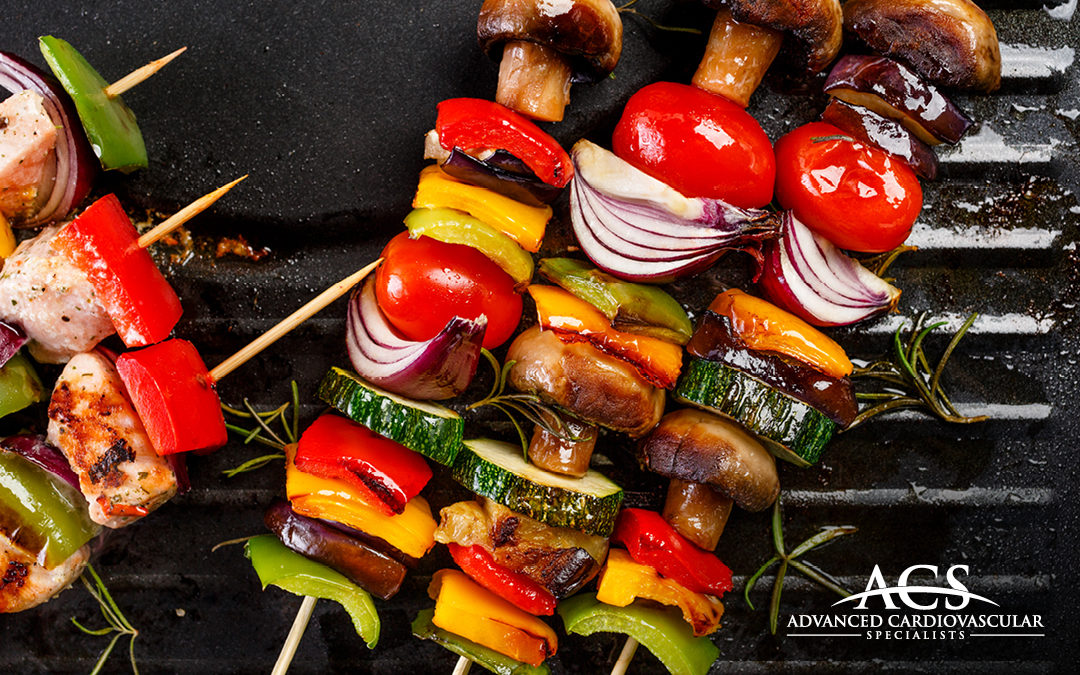Summer is a great time to focus on creating a more heart-healthy diet. With an abundance of fruits and vegetables in season and warmer temperatures that create a natural shift toward lighter eating, it’s often an easier time of the year for many people to incorporate more fresh produce and less processed foods.
The other big advantage of summertime is that it’s also grilling season. Grilled fish, meats and vegetables not only taste great, but they’re also healthier than other cooking methods like frying or sautéing in heavy sauces. However, there are some caveats.
You still need to watch what foods you choose and your portion sizes. Grilling may be a healthier way to eat, but not if you are loading up on too much red meat and high-calorie sides. The good news is that there many ways to keep your taste buds happy and your heart healthy when grilling.
1. Grill Your Veggies.
Whether you’re serving them with a protein or on their own, vegetables and even some fruits are fantastic on the grill. It’s a delicious and easy way to get your 5+ servings a day. Some of the best produce for grilling includes onions, bell peppers, zucchini, eggplant, mushrooms, asparagus, sweet potatoes, corn, pineapple and peaches.
2. Choose The Right Protein.
Red meat has more saturated fat than chicken and fish. While it’s okay to enjoy beef, pork and lamb in moderation, it shouldn’t be your daily choice. It’s especially important to minimize or avoid processed red meats like sausages, bacon and hot dogs. Instead, choose lean cuts of red meat, or (even better) opt for lean chicken (skin off) or fish. For burgers, try turkey or a veggie burger made with beans.
3. Watch Your Portion Sizes.
Although you can generally eat as much non-starchy vegetables as you like, this is not the case when it comes to meat, carbohydrates and fats. A single serving of meat is 3 ounces, which is roughly the size of a deck of cards or the palm of your hand. For carbs, a serving will be one slice of bread or a tortilla, a medium potato, or half a cup of rice or pasta (about one cupped handful). For fats, try to stick to a teaspoon of oil, butter or mayonnaise or about the size of your thumb for foods like avocado or nuts.
4. Do Some Prep Work.
A simple marinade or rub can add sensational flavor to grilled meat, poultry, fish and vegetables, and it is best applied an hour or more before grilling. Make sure you trim off all visible fat from meats, and remove skin from chicken before grilling. Premake your sides as well, so you’re not reaching for unhealthy processed foods at the last minute. Salads, beans, and grilled or baked vegetables are all great choices.
5. Go Light On The Sauce.
If you get the prep work and grilling right, you shouldn’t need any sauce. If you’re looking for something a little extra, consider healthier toppings like salsa or pico de gallo, low-fat sour cream or a vinaigrette.
Now that you know the basics when it comes to heart-healthy grilling, here is an easy marinade recipe to get you started.
Balsamic Marinade
This is so quick and delicious! Simply whisk all of the ingredients together, and marinate your meat, fish or veggies for at least an hour.
- 1/4 cup extra virgin olive oil
- 3 tablespoons balsamic vinegar
- 1 tablespoon Dijon mustard
- 2 cloves garlic, minced
- 1 tablespoon Italian seasoning (or whatever mixed herbs you have on hand)
- salt and freshly ground pepper, to taste
The team at Advanced Cardiovascular Specialists consists of North Louisiana’s leading experts in cardiovascular care. To schedule an appointment, please call our office at (318) 798-9400.

